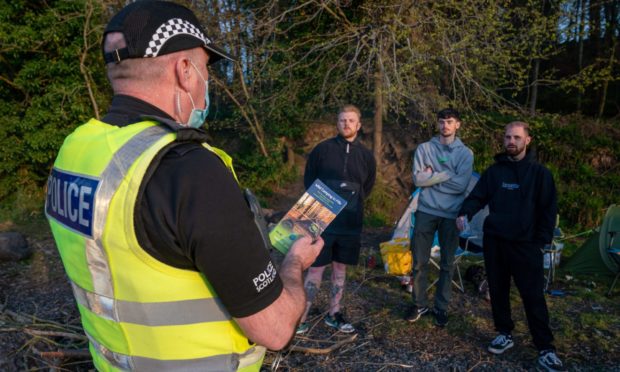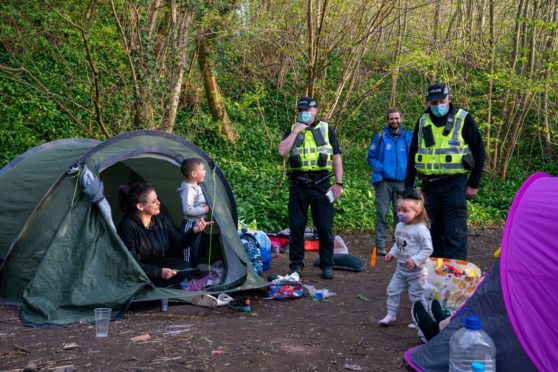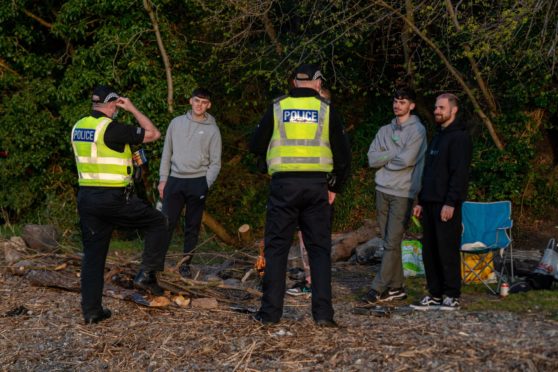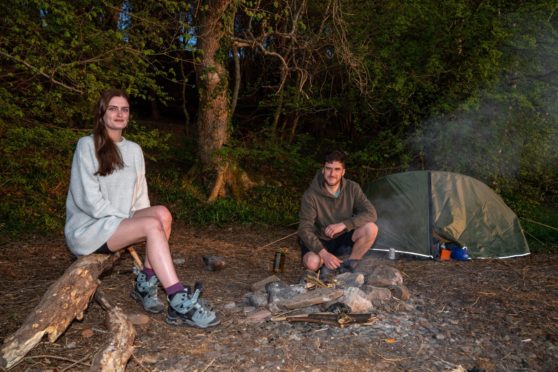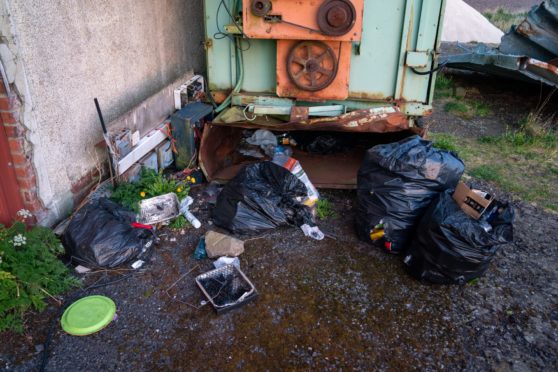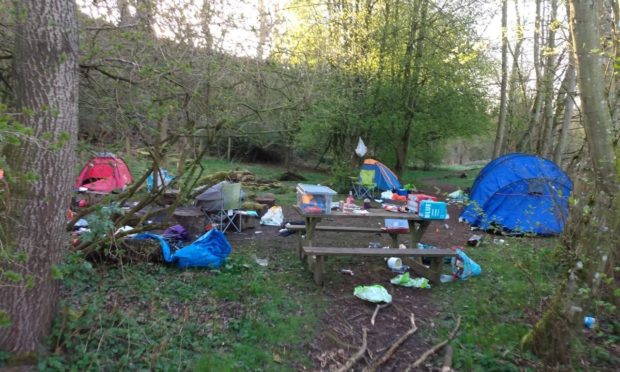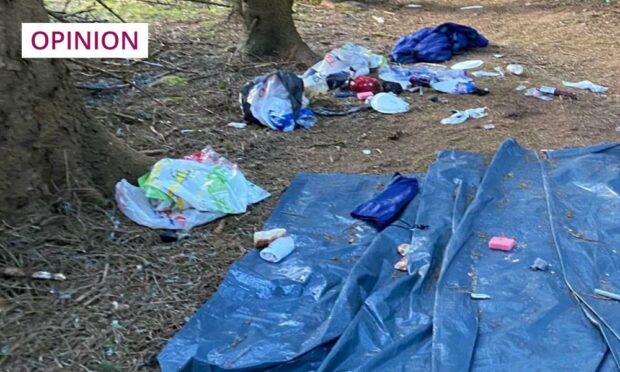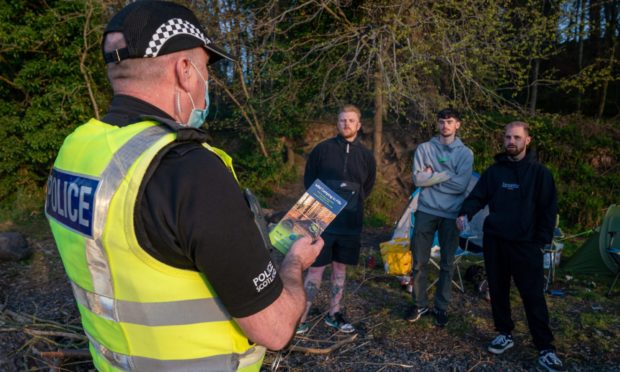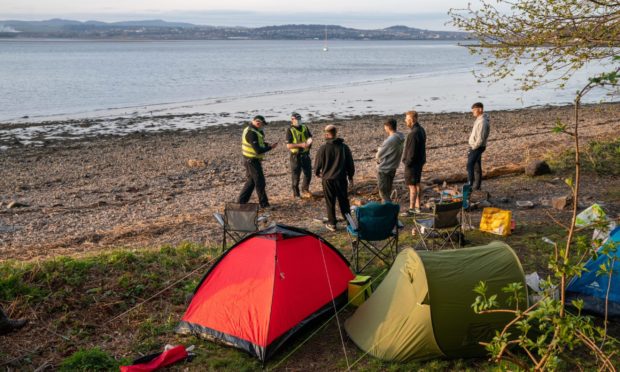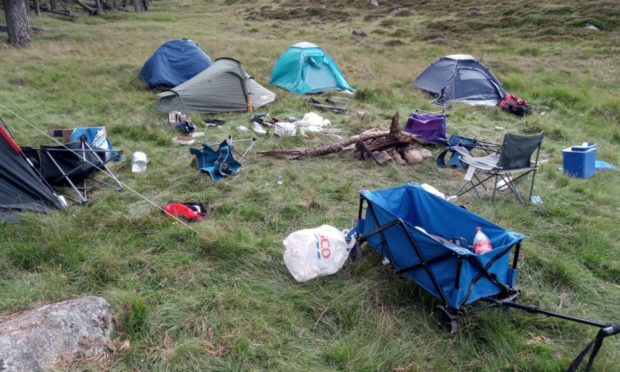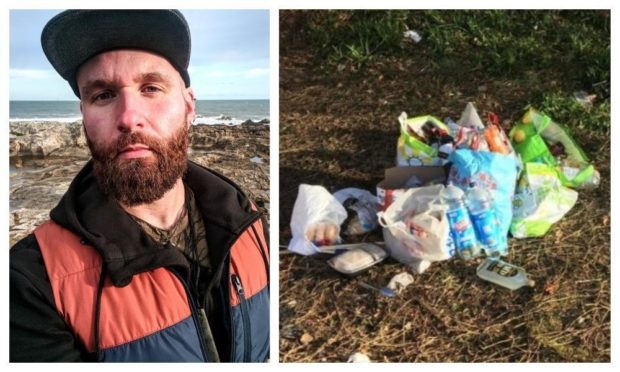Police targeted potential ‘dirty camping’ over the weekend as hundreds flocked to Fife beauty spots.
Community officers joined staff from the Fife Coast and Countryside Trust and the council in an attempt to educate groups with little experience of outdoor access rules.
I joined them during one of their action evenings designed to prevent dirty camping in Fife before it occurs at hotspot locations.
Hundreds visit beaches, woods and hills
Darren Reid, 29, from Dundee, was relieved to discover the multi-agency group did not intend to move him and his three friends on.
“We’ve been out a few times before. But then Covid hit and you’ve gotta do what you’ve got to do,” he said when asked why he and his friends were there.
But the patrol could only speak to a fraction of the campers who had set up camp on Fife’s north coast for the warm April weekend, raising further questions over the resources needed to tackle the ‘dirty camping’ problem in Fife effectively.
And while all the campers responded well while faced with the multi-agency patrol, others resorted to verbal abuse once the police cars had left.
Fife Coast and Countryside Trust head of operations Robbie Blyth had a busy weekend.
He arrived in North Fife fresh from an incident further south where a group of campers in their forties alarmed locals with an electricity generator “the size of a mini”.
“They appeared to be reliving their youth,” he said.
Robbie and conservation officer colleague Dominic Rye represent the trust on Saturday night’s education action.
PCs Lee Robb and Ewan McIntosh join them from the Fife force’s community team. While Mike Rennie, from the council’s safer communities team, completes the ‘dirty camping’ patrol.
The trust have asked me not to mention the specific location for fear it could attract more problem campers.
‘There is nothing else to do’
PC Robb is a supporter of greater education.
“This [dirty camping] is becoming more and more of a problem. It is not our day-to-day job,” he said.
He will later give two Dundee mums advice on how to do the toilet in the woods.
The mums, with two suitcases full of clothes, two tents and six children, have only been camping once before.
They appear alarmed to see the officers arrive.
“We bag up our rubbish as we go. We don’t leave anything with us,” one said.
They said they brought fish and chips for tea with them on their last trip.
“This is our second time out here. It’s just so we can get together. It’s good to get the kids away from the iPads and whatever.”
‘We know the script’
Dundee based friends Kyle King, 22, Darren Reid, 29, Callum Butler, 25 and Jack Scott, 20, have a sound system on and are enjoying a few drinks by the fire.
The patrol reminds them about their rubbish and Robbie offers safety advice as they have put up their four tents too close together and near the open fire.
Darren, who is heavily tattooed on his body and face, said he could understand why local residents — worried after previous dirty camping issues in Fife — might give him a wary reception.
“The way a couple of us look. We get treated differently. But we’re sound guys. Folk have been coming up here walking their dogs. Are they going to be sound with us?”
It is Callum’s first time camping. The barber moved from London to Dundee three years ago.
“It’s amazing sitting here, watching the sun go down.”
I ask him if he is aware of the increasingly fearful reaction from many residents faced with such a large number of campers.
“We’ve not been snapping trees or anything like that. We know the script. No-one should know that we have been here.
 Darren has been camping before but “not for a while”.
Darren has been camping before but “not for a while”.
“More or less everything is shut. There is nothing else to do.”
After leaving the friends, I ask Robbie if he had any concerns the campsite could have been left in a mess the next day.
“Not now. That’s not wild camping, though,” he said.
Dirty campers ‘ruin best spots’
Couple Danny Kennedy, 27, and Chantelle Maroney, 29 – also from Dundee – are camping less than 100 metres away.
The hikers have taken a very different approach.
Robbie highlights their tidy campsite is exactly what the trust looks for from a responsible wild camper, as opposed to the dirty campers who leave a mess in their wake.
Danny has been camping here for 15 years. He said he picks up other people’s litter, often leaving with a fuller rucksack than the one he arrived with.
“We used to come here regularly. All the spots we used to camp have all been ruined.”
“There’s glass everywhere,” agreed Chantelle.
Are police patrols in Fife a heavy-handed solution to the ‘dirty camping’ problem?
“No.” Danny shakes his head. “Not if you’ve not got anything to hide. Education is good. There are so many people doing it that nobody is educated.”
‘Best holiday of their lives’
Despite the dirty camping problems, Robbie, from Glenrothes, remains passionate about getting more people to enjoy the outdoors responsibly.
He says the Dundee children he spoke to earlier will “probably remember this as the best holiday of their lives”.
Armed with the trust’s leaflets, he tells me boots on the ground and education remain the best way forward.
I ask him if he is aware that many people will consider the approach too soft touch, given the growing scale of the ‘dirty camping’ problem in Fife.
“It’s still about educating people. People have the right to roam, but they must be aware that comes with responsibilities too.
“If things go really badly then we get a good response from Police Scotland. There are enforcement actions we can take.”
He said dealing with the growing number of people accessing the Kingdom’s wild spaces now uses up a large amount of the trust’s resources.
“We can’t manage the countryside the way we used to 25 years ago. Times have changed,” he said.
